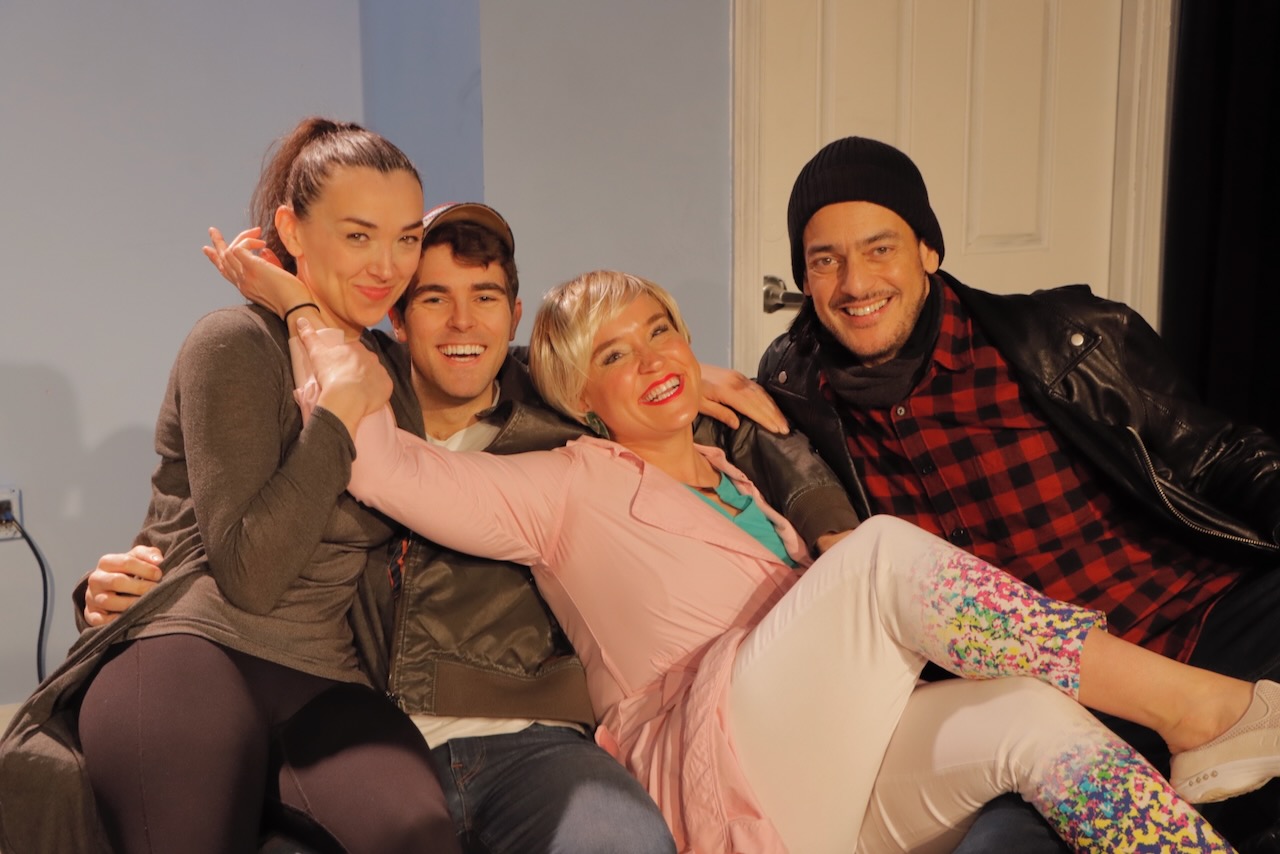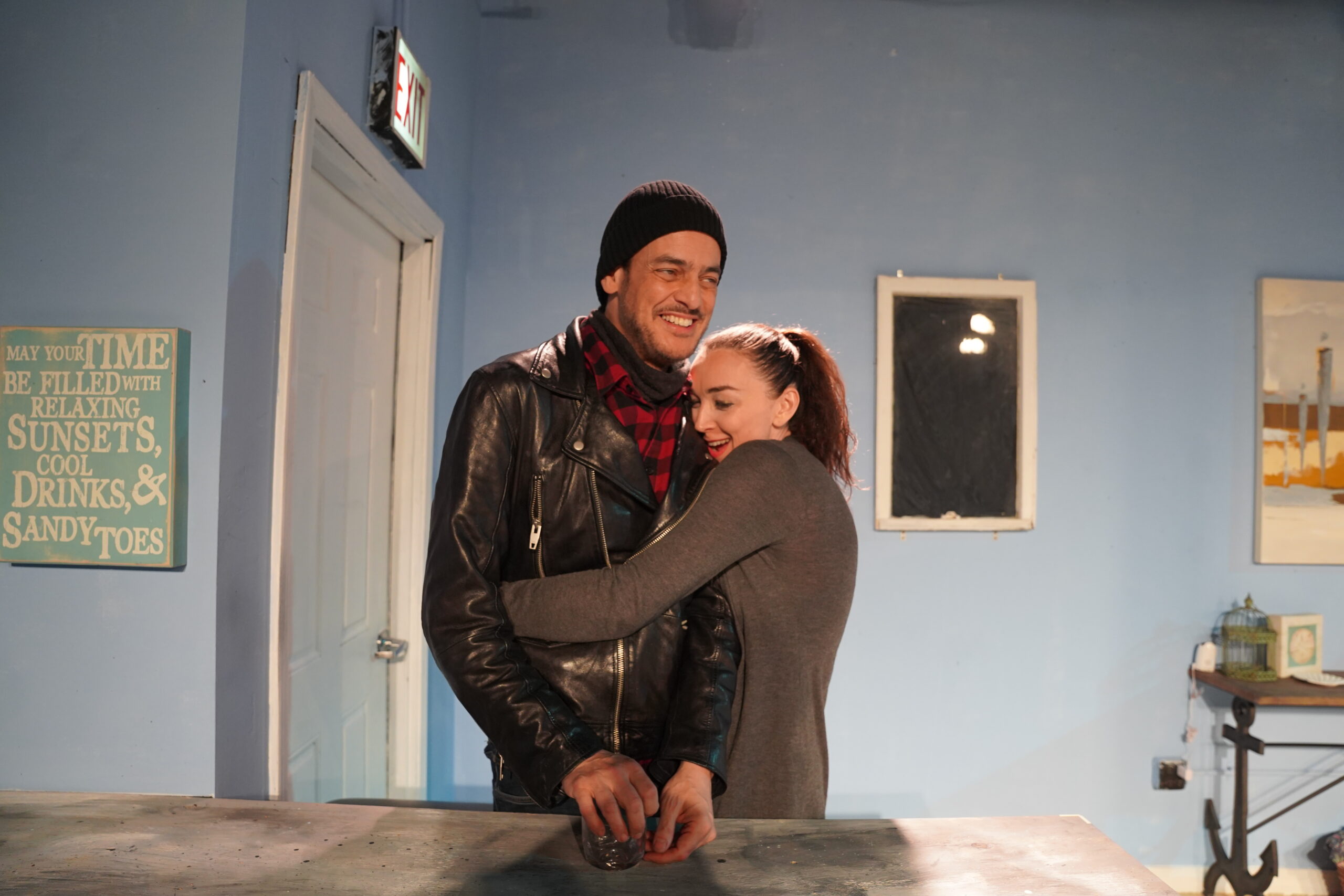DECOLONIZING SARAH: A HURRICANE PLAY. Written and directed by Samer Al-Saber. Uprising Theater at The Den Theatre, Chicago. April 1, 2023.
Reviewed by George Potter, Valparaiso University
In the middle of Samer Al-Saber’s play Decolonizing Sarah: A Hurricane Play, the title character states, “I didn’t sleep that night wondering whether I am a fucking racist.” Such a statement could also read as a mission for the play: to make the audience stay awake questioning the layers of internalized racism within themselves.
The play tells the story of a former couple, the white woman Sarah (Maren Rosenberg) and the Palestinian man Waleed (Kal Naga, known for numerous films and series in Egypt), who hole up in an Airbnb in Florida during a category 3 hurricane as their own simmering tensions rise, calm, and rise again. Outside, Sarah has already begun a relationship with Charles (Whitman Johnson), a white man with inherited wealth, who casually jokes about his friends’ racism and his relatives’ conservative politics. Next door, the neighbors (Cat Hermes and Johnson again) wonder why there are two people in their Airbnb booked for one and assume that the Arab man must be the problem in need of removal, with the proverbial gun in the first act hanging over their questions. The story unfolds by bouncing between past and present, showing the new relationship with Charles developing as tensions (and winds) rise in Florida while Sarah and Waleed contemplate getting back together.

Cast of Decolonizing Sarah. LtR Maren Rosenberg as Sarah, Whitman Johnson as Charles, Cat Hermes as Melissa, and Kal Naga as Waleed. Courtesy of Chicago’s Uprising Theater.
Al-Saber also served as the director of the production, the first fully mounted show by Uprising Theater, a new Chicago company that “prioritize[s] plays that present the Palestinian experience to the public.” The relatively recent formation of the company gives a scruffy quality to the production, accentuated by viewing it in previews. In the pivotal fight scene, the set itself seemed to shake unexpectedly, perhaps appropriate for a hurricane, but likely a bit unnerving for the actors.
That having been said, the meat of the show is in the love triangle, one that exists not just to decide who Sarah will choose, but to question the limits of white liberalism. Sarah is collaborating with her friends, most notably Melissa (also played by Hermes) to develop an app that promotes “transnational feminism” and “solidarity,” despite Waleed appearing to be the only transnational presence. One assumes that Sarah likely has attended numerous marches and protests in her time. Yet she also feels drawn to Charles and the comfort of white privilege, a life of easy choices and not having to wonder what to name the kid, what language(s) to speak at home, what religion to practice, and an endless sea of having to defend one’s partner and child against racism. Throughout the play, there is a running joke about the appropriation of hummus, a bit of comedy that also highlights the removal of all aspects of culture from Palestinians, from land to food. Waleed knows that the avenues of privilege that exist for Sarah are not there for him, and Sarah struggles with the gap between her stated politics and how far down the road of solidarity she wants to walk in order to stand in the space where Waleed is forced to live.
This is heavy material, and the play is bursting with words and ideas. It is at its best in the moments when Waleed and Sarah enact their conflict, forcing one another to deal with the consequences of their relationship. At the same time, the show itself feels torn, with the structure of the play being built around Sarah’s experience and the ideology of the play aligning with Waleed’s worldview. This can cause the play to run as a long examination of Sarah’s flaws. In classical tragedy, such an examination would lead to recognition and reversal, but Al-Saber holds to the idea that Sarah has unexamined ideological limitations that she cannot overcome. As both Waleed and Melissa question Sarah, one wonders why either was so dedicated to rehabilitating (and loving) Sarah in the first place. The play seems bereft of moments where Sarah is lovable (even with Charles, she wins him over by cooking for him and having sex with him, not by who she is). The acting was all competent throughout, but there was a lived-in-ness to the relationships that always seemed slightly out of reach. However, as a vessel for the play’s critique of liberal multiculturalism, Sarah clearly serves an ideological purpose.

Waleed (Kal Naga) and Sarah (Maren Rosenberg) in Decolonizing Sarah. Courtesy of Chicago’s Uprising Theater
In many ways, Al-Saber’s play exists as a conversation with many other Arab and Muslim American works that have also been produced in Chicago. The most striking comparison comes by way of Ayad Akhtar’s Disgraced, a play that appeared at the American Theater Company before traveling to New York and returning to the Goodman Theatre as a Pulitzer Prize-winning success. Akhtar’s play famously reaches its climax in a scene where the Muslim American protagonist violently strikes his white female partner. Al-Saber’s play inverts this moment, having Sarah escalate an argument into violence, first begging Waleed, “Please hit me instead. Absolve me. I do not want to live this guilt anymore. Let me live this down. Hit me,” then choosing to hit Waleed when he refuses to strike her. All this comes after she says: “I am decolonizing. You are my fight. I’ll be yours. Be my Arab.”
One of the critiques of Disgraced has long been that Akhtar’s play flirts–if not outright states–that hitting women is something rooted in being a Muslim man, rather than in the flaws of its protagonist alone. By comparison, Al-Saber’s play roots the violence in the persistence of white supremacy, seen both in the threatening neighbors next door and in Sarah’s ability to resort to violence within the home if it gets her what she wants. This having been said, in the context of the play alone, one wonders to what extent hitting or being hit by a lover is a product of racial privilege, sexual desire, or some combination of the two. Charles states that he felt served by Sarah. Sarah tells her friend Melissa that Charles awoke something in her. There are references to primal, possibly rough sex. Does she want Waleed to hit her because she enjoys that kind of sex? Because she has a stereotype of Arab men? Because she believes she should be punished for desiring Charles? Does she hit him out of fantasy or privilege or self-loathing or some combination of all? At one point, Melissa accuses Sarah of “fucking your politics,” and the fucking in the play likewise occasionally muddles its politics.
Decolonizing Sarah also feels like a dark response to other, happier Arab intercultural romances on American stages. The same weekend it ran, the Goodman completed a run of Martin Yousif Zebari’s Layalina, a work that envisions the United States as a safe haven for queer Iraqi refugees (at the same time that anti-LGBT+ legislation runs rampant in the states around Illinois). Similarly, Youssef El Guindi’s The Pilgrims Musa and Sheri in the New World shows a relationship between an Egyptian American man and a white American woman as being better for both than the relationship with an Egyptian woman that its protagonist had previously been in. Decolonizing Sarah has no such hope. Instead, the play’s final scene, in this performance, had Sarah saying, “This was always going to be my life” in regard to breaking up with an Arab man and marrying a rich, white man.
This skepticism feels reminiscent of many African American films of the 1990s (Jungle Fever and The Watermelon Woman come quickly to mind) as much as anything in recent Arab American performance. And one is certainly left wondering whether there is some space between romantic idealism and violent conflict. Certainly, it feels better to hope that Al-Saber’s play is a provocative moment of overstatement. I’m not convinced it is overstatement.
Interestingly, the text of the play has two alternative endings: one where Sarah walks offstage and clearly chooses to marry Charles, and another where there is a hesitation and the small possibility that she and Waleed will try again. Though Al-Saber chose the more hopeful ending for this audience, I did not find myself believing that Waleed and Sarah would work out in the performance (and I’m not sure that their being together would be either healthy or hopeful). The hesitation means to suggest a potential retreat from Sarah’s assertion that “[Marrying Charles] was always going to be my life”—but in this production, the pause at the end felt less like Sarah trying to decide which man to choose, and more like Al-Saber and the audience engaged in a stare down over whether this relationship could ever work. In the pause—and the possibility that Sarah might change her mind yet again—one can feel the pressure of white audiences (and white subscribers) weighing on the script, trying to pull it into an ending where their liberalism, without change, is enough to usher in a happy ending, as if liberal apps or audiences closed Guantanamo Bay or ended hate crimes. Unfortunately, too many theater audiences still want attending a “diverse” play to be their activism, and it seems like Decolonizing Sarah: A Hurricane Play will scare away many commercial producers and, instead, find a home on college campuses with very carefully moderated talkbacks afterward. Sarah might even attend such an event. One can only hope that she recognizes herself in it.
George Potter is an Associate Professor in the Department of English at Valparaiso University. He has published in College Literature, The British Journal of Middle Eastern Studies, Arizona Quarterly, The Journal of American Drama and Theatre, and multiple book collections. His current research focuses on Islamophobia in liberal responses to the war on terror. His directing credits include a production of Jamil Khoury’s play Mosque Alert at Valparaiso University and a staged reading of Fawzia Afzal-Khan’s play Jihad Against Violence: Oh ISIS Up Yours! at Silk Road Rising in Chicago.

Arab Stages
Volume 14 (Spring 2023)
©2023 by Martin E. Segal Theatre Center Publications
Founding Editor: Marvin Carlson
Founders: Marvin Carlson and Frank Hentschker
Editor: Edward Ziter
Performance Reviews Editor: Katherine Hennessey
Book Reviews Editor: George Potter
Editorial and Advisory Board: Fawzia Afzal-Khan, Dina Amin, Khalid Amine, Dalia Basiouny, Katherine Donovan, Masud Hamdan, Sameh Hanna, Rolf C. Hemke, Areeg Ibrahim, Jamil Khoury, Dominika Laster, Margaret Litvin, Rebekah Maggor, Safi Mahfouz, Robert Myers, Michael Malek Naijar, Hala Nassar, Juan Recondo, Nada Saab, Asaad Al-Saleh, Torange Yeghiazarian.
Managing Editors: Melissa Flower Gladney and Juhyun Woo
Table of Contents:
Up There by Wael Kadour, Introduction by Edward Ziter
Baba written by Denmo Ibrahim, directed by Hamid Dehghani, reviewed by Suzi Elnaggar
Layalina written by Martin Yousif Zebari, directed by Sivan Battat, reviewed by Sami Ismat
Mother Courage adapted and directed by Alison Shan Price, reviewed by Hassan Hajiyah
Playwright Showcase, New Arab American Theater Works, reviewed by Katherine Hennessey



